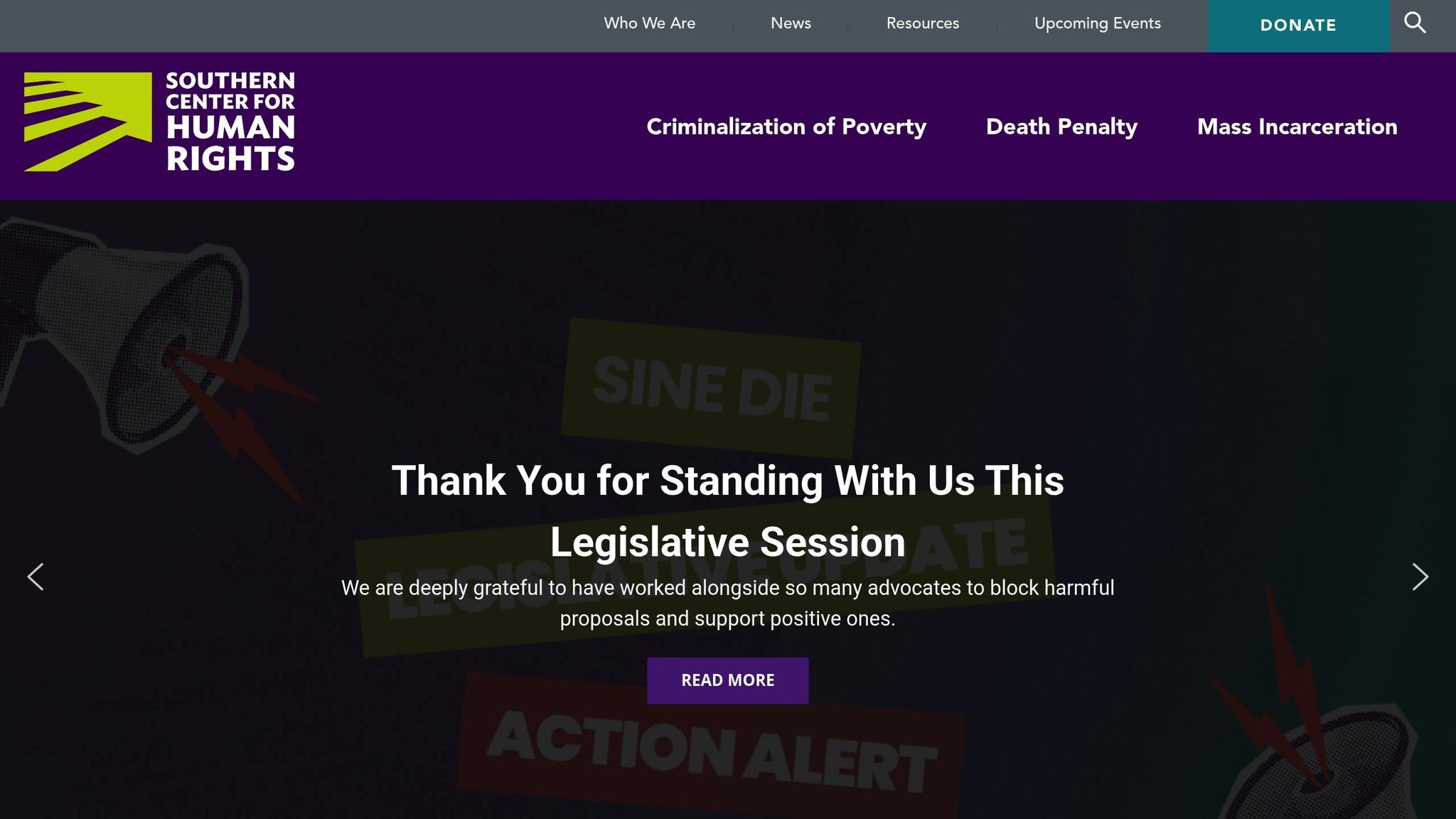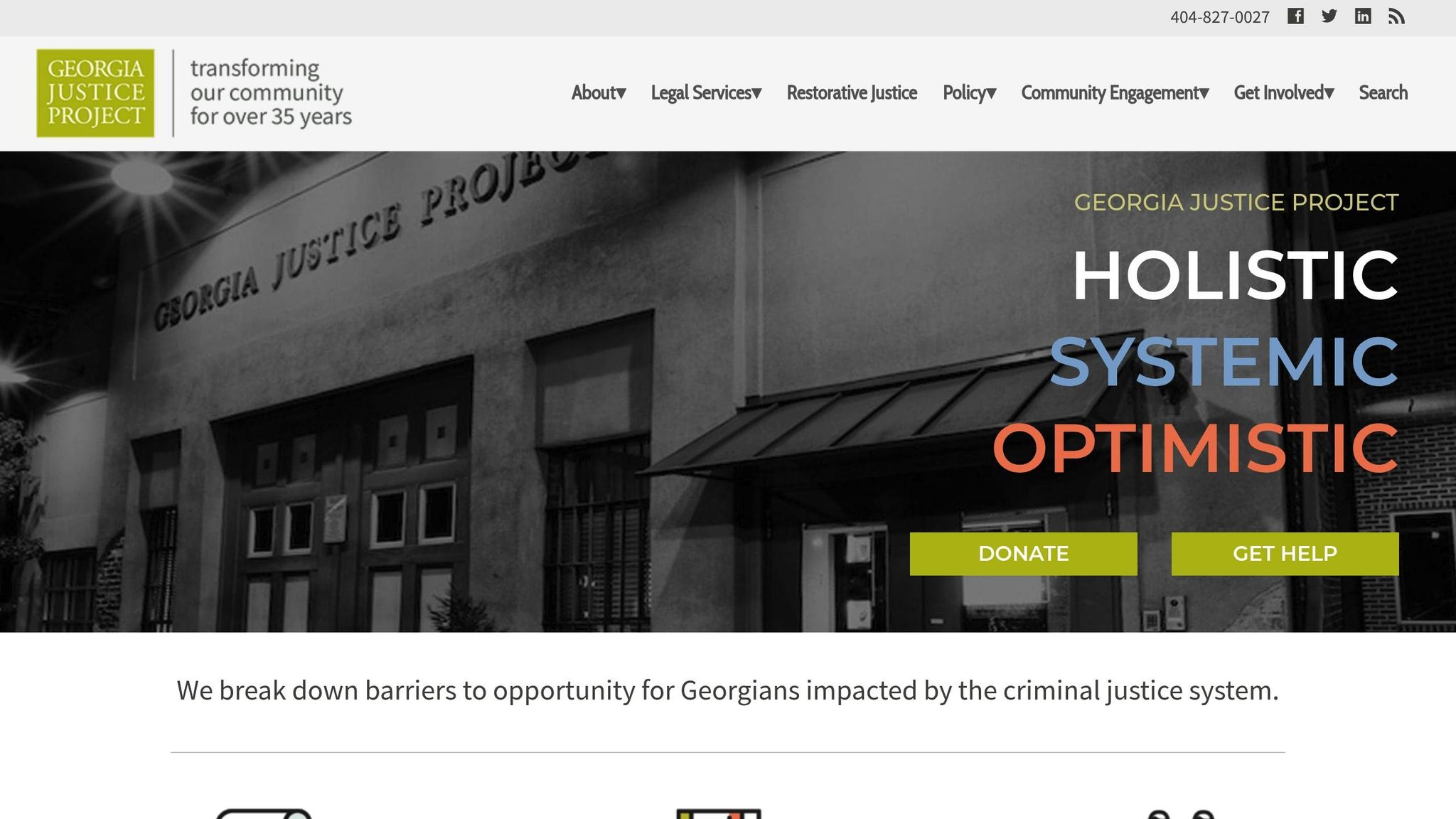Pro bono legal services in Georgia provide free legal help to prisoners who can’t afford a lawyer. These services focus on critical issues like constitutional rights, prison conditions, medical care, and appeals. Key organizations, such as the Southern Center for Human Rights (SCHR) and Georgia Justice Project (GJP), assist inmates in navigating the legal system. To qualify, inmates must demonstrate financial need and provide documentation like prison account statements and case records. Priority is given to high-risk cases, vulnerable populations, and systemic issues. Family members can also play a vital role in supporting the application process. Learn how to access these resources and ensure justice for those in need.
Lisa J. Krisher oral history interview, 2002-07-18
Who Qualifies for Pro Bono Legal Help
Pro bono legal help for inmates in Georgia prisons is available based on specific criteria. These guidelines determine who can apply and what issues are covered.
Income Requirements
To qualify, inmates must demonstrate they cannot afford private legal representation. This is assessed through:
- An income at or below 125% of the Federal Poverty Level
- Personal assets under $5,000 (excluding basic necessities)
- No financial support from family or other sources
Applicants must provide clear documentation, such as:
- Prison account statements
- Records of income before incarceration
- A list of current assets and liabilities
- Proof of any outside financial assistance
Proper financial documentation is a critical step before legal issues are reviewed.
Legal Issues Covered
Pro bono services focus on specific types of cases, including:
- Violations of constitutional rights
- Prison conditions and treatment concerns
- Access to medical care
- Cases involving religious freedoms
- Post-conviction appeals
- Parole hearing representation
- Family law matters (e.g., custody, divorce)
- Civil rights violations
Cases involving urgent safety concerns or constitutional issues are given priority.
Priority Groups
Certain groups of inmates are prioritized for pro bono assistance based on their circumstances:
1. High-Risk Cases
- Death row inmates
- Those experiencing severe constitutional violations
- Individuals with urgent medical needs
2. Vulnerable Populations
- Inmates with mental illnesses
- Elderly prisoners (65+ years)
- Those with physical disabilities
- Non-English speaking inmates
- Juveniles housed in adult facilities
3. Systemic Issues
- Facility-wide problems, such as poor conditions
- Barriers to healthcare access
- Religious discrimination
- Violations of ADA compliance
The process requires detailed documentation and collaboration with prison staff, legal aid groups, and families. These steps ensure that the application process is thorough and organized, making it easier to move forward with legal assistance.
Pro Bono Legal Organizations in Georgia
In Georgia, several organizations provide free legal help to prisoners, tackling different challenges within the state’s prison system.
Southern Center for Human Rights (SCHR)

SCHR offers legal representation in cases involving constitutional rights, capital defense, and prison conditions. They work to address pressing legal issues while advocating for broader reforms.
Georgia Justice Project (GJP)

GJP focuses on helping individuals with record sealing, probation termination, reentry support, and improving employment opportunities. Their efforts aim to reduce the obstacles faced by people who were formerly incarcerated.
Self-Help Legal Resources
Prison law libraries in Georgia provide access to guides, manuals, and legal forms on topics like post-conviction procedures, civil rights, and appeals. Programs featuring law clerks and paralegals are available to assist prisoners in navigating these resources. Together, these efforts help ensure fair legal representation for prisoners in Georgia.
sbb-itb-7858f51
How to Get Pro Bono Legal Help
Documents You’ll Need
Before starting, make sure you have these documents ready:
- Personal Information: Your full legal name, inmate ID number, and the location of your current facility.
- Case Records: Sentencing documents, court records, and any prior appeal decisions.
- Financial Records: Prison account statements and an affidavit of indigency.
- Medical Records: Relevant paperwork if your case involves medical neglect or healthcare issues.
- Filed Grievances: Copies of grievances you’ve submitted and any responses received.
- Additional Evidence: Witness statements, photos, or video evidence that supports your case.
Once your paperwork is in order, you’re ready to move to the application process.
Steps to Apply
Here’s how you can apply for pro bono legal assistance:
- Reach Out: Write a detailed letter explaining your situation. Include your contact information and inmate ID.
- Case Review: After receiving your letter, the legal organization will review your case and may ask for more details or documents.
- Follow Up: If you don’t hear back within the expected timeframe, send a follow-up letter. Reference your initial inquiry and provide any updates on your case.
Role of Family Members
Family members can play an important role in speeding up the process. They can:
- Stay in Touch: Maintain regular communication with both the incarcerated individual and the legal organization.
- Help with Documents: Assist in collecting paperwork that might be harder to access from prison.
- Consider Power of Attorney: If needed, they can obtain power of attorney to handle certain legal matters more efficiently.
- Follow Communication Guidelines: Use certified mail for important documents, keep records of all correspondence, and adhere to the organization’s rules.
Limits of Pro Bono Legal Services
Pro bono legal services often struggle with limited capacity, which can leave individuals waiting for formal representation. During these delays, self-help legal resources become essential. GPS offers a platform where prisoners can exchange experiences and access practical advice to bridge these gaps. To explore more about managing legal challenges, check out the next steps.
Next Steps
Main Points Review
Pro bono legal services play a crucial role in helping financially eligible Georgia prisoners address constitutional and civil rights issues. Organizations such as the Southern Center for Human Rights and Georgia Justice Project provide critical assistance through their established programs and resources.
Ways to Help
Community involvement is essential to improving legal support and advancing prison reform in Georgia. Here are some ways you can contribute:
Take action:
- Document and report violations of constitutional rights in Georgia prisons.
- Help connect families with available legal resources.
- Support advocacy efforts led by organizations like GPS.
Engage with your community:
- Participate in public awareness campaigns.
- Reach out to government representatives to advocate for reform.
- Use community initiatives to amplify the voices of prisoners.
Achieving meaningful reform requires a sustained effort from community members, legal professionals, and advocacy organizations. Together, these efforts can drive lasting change.
